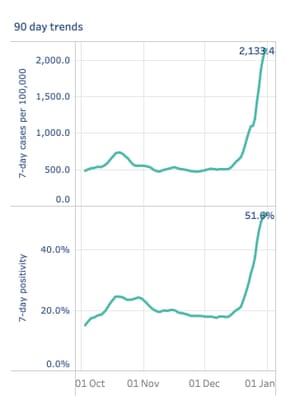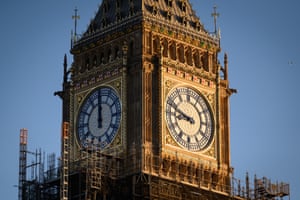Nicola Sturgeon has cut Scotland’s self-isolation period from 10 to seven days, after sustained pressure from businesses and opposition parties to address soaring staff absences.
The first minister has softened her government’s highly cautious stance on the 10-day isolation period after hospitals data suggested the Omicron variant is less medically severe than first feared.
Ministers in England and in Wales cut it to a week in December after deciding the impact of an extended self-isolation period on public services and businesses was not outweighed by Omicron’s risks to health and critical care services.
In a recalled session of the Scottish parliament, Sturgeon told MSPs people could end their self-isolation after seven days if they have no fever and have two negative lateral flow tests.
Close contacts will not be expected to self-isolate if they are fully vaccinated, have no symptoms and record negative tests every day for seven days, under the new rules which take effect from midnight on Wednesday.
She acknowledged these new rules were “more proportionate and sustainable and less restrictive”.
Sturgeon’s move came after Scottish hospitals warned their services were under significant strain due to staff absences and ScotRail, the main trains operator, cut hundreds of trains this month and is operating a reduced timetable due to staff shortages. Hospitality companies and retailers have struggled to remain open, and complained bitterly about the impact on their businesses.
While Scotland has recorded its highest-ever Covid infections figure of 20,217 on Monday – a figure partly inflated by results delayed by the holiday weekend – critical illness rates have remained stable.
There were 1,223 people in hospital on Wednesday, more than double the number seven days ago, but the number in intensive care has remained relatively stable, at around 52 or 53 people a day. Ministers have so far failed to state whether they were hospitalised because of Covid or were found to be Covid-positive after admission for another reason.
Sturgeon said the latest ONS data suggested that 1 in 20 Scots had had Omicron last week (see 2.17pm), a figure similar to the rates in many English regions. The rate before Christmas had been 1 in 40. She went on:
The proportion of people with Covid is likely to be even higher than that now, a few days later – and I would anticipate that we will see continued growth in the level of infection as work and school resume after the holiday period.
In short, Covid is significantly more widespread now than at any stage in the pandemic so far, and will almost certainly become even more so in days to come. This, of course, has extremely serious implications for the NHS and social care. But it also has a severe and increasing impact on the economy and other critical services.

The Irish government has decided antigen or PRC tests are no longer a pre-requisite for vaccinated travellers coming from Great Britain or elsewhere. The restriction was introduced in December but will be removed from tomorrow – but will still apply to those who have not been jabbed.
The taoiseach, Micheál Martin, told reporters it was because the Omicron variant “now constitutes about 96% of all cases” and the test was no longer necessary.
Fresh questions about the Scottish government’s very cautious stance over the Omicron variant have emerged after Public Health Scotland apparently denied it would be publishing data on how many people have been hospitalised because they have Covid.
Nicola Sturgeon, the first minister, has refused to cut Scotland’s self-isolation rules from 10 days to seven in line with the rules in place forEngland and Wales, arguing that the Omicron’s very high infection rate could overwhelm Scottish hospitals. She is likely to finally relax them in a statement to MSPs shortly.
The latest headline data shows the number of people in Scottish hospitals has doubled over the past week to 1,147 on Tuesday: that appears to support the case for caution.
But the latest English data suggests a third of Covid-positive people in hospital south of the border were admitted for other medical reasons, and not because they were ill with Covid. That suggests the Omicron variant is having a lesser impact on NHS resources than previous variants and could support demands for less onerous rules in Scotland.
John Swinney, Sturgeon’s deputy first minister, has promised recently that Public Health Scotland, a government agency, would release Scotland’s data Covid-positive patients on Wednesday.
The political journalist Chris Musson, of the Scottish Sun, has reported that PHS has denied it plans to do so.
Chris Musson (@ChrisMusson)
Scot Gov ministers have been asked repeatedly over festive period for a breakdown of Covid hospital patients vs positive patients being treated for other conditions
Yesterday, DFM John Swinney said Public Health Scotland would publish details today.
PHS now saying they are not
That is likely to fuel opposition criticisms later over whether Sturgeon has had the right evidence to justify her ultra-cautious stance and questions over whether that has caused unnecessary harm to Scottish public services, hospitality outlets and businesses.
Source: Guardian








